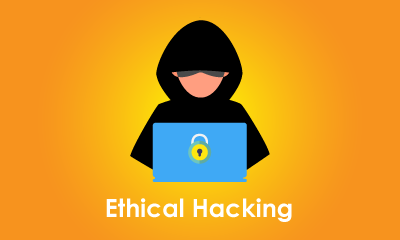- Home
- Blog
- Cyber Security
- Cyber Security Certifications

- Cyber Security Career Path
- Cyber Security Frameworks
- Cyber Security Interview Questions
- Cyber Security Threats and Prevention Methods
- Top 10 Cyber Security Tools In 2024
- How to Become a Cyber Security Engineer
- Reasons to Learn Cyber Security
- Cyber Security Best Practices
- What is Cyber Security?
- New Technology Trends in 2024
- Spoofing vs Phishing
- Penetration Testing Interview Questions
- Network Security vs Cyber Security
- What is Penetration Testing?
- Bug Bounty Interview Questions
- CRISC VS CISA
- Cyber Security VS Data Science
- Cybersecurity Projects and Use Cases
Cyber-attacks are always on the rise, undeniably. They are usually made to access, modify, or destroy the sensitive data or systems of organizations on a larger scale. Cybercriminals launch cyber-attacks with the intention of threatening organizations for the sake of money, collapsing their regular business, or other reasons.
Know that Trojans, man-in-the-middle, phishing, malware, and denial of services are a few cyber-attacks made by cyber criminals to harm computers, servers, networks, and other systems. That’s why Cybersecurity has become one of the inevitable practices in organizations. It doesn’t matter whether it is a low-level or middle level or high-level organization – all need to secure their systems absolutely.
Here Is The List of Top Cybersecurity Certifications
- CompTIA Security
- CompTIA Pentest+
- CISSP
- CISA
- CISM
- CEH
- CASP+
- CCSP
- CHFI
- ECSA
- GCIH
- GSEC
- GCFA
- GMOB
- GPEN
- OSCP
- SSCP
- CCNP Security
- CRISC
- CCSK
- CCAK
- CCNA Security
- CWSP
- CPP
- CCIE Security
What is Cyber Security?
Cybersecurity is also known as information systems (IS) security. The goal of Cybersecurity is nothing but to protect the data and systems from unauthorized access, exploitation, and destruction. In other words, it is a set of practices that protect computers, servers, mobiles, networks, and sensitive data from malicious attacks. The techniques include identity management and access control, security assessment, security operations, testing, risk management, etc. Besides, we can defend the systems by leveraging robust security controls and technologies.
| Gain essential skills to defend your organization from security threats by enrolling in our "Cyber Security Training" |
Why is Cybersecurity important?
- Cybercriminals come with advanced attacking techniques every time. So, it is essential to protect systems more securely.
- By establishing Cybersecurity controls and practices in your IT environment, we can intelligently prevent cyber-attacks before they cause severe harm.
- If you have become a victim of any cyber-attack, your business reputation is questioned in the market.
- The cost of cyberattacks is too high. Based on a recent survey by Statista, the average cost of data breaches is around 3.86 million USD worldwide.
- On top of all, Cybersecurity will bring peace of mind to companies, employees, and users. So they can focus on other vital areas peacefully.
Role of Cybersecurity Professionals:
Cybersecurity professionals work actively to ensure the security of your systems, networks, and data. They accomplish this in many ways. They perform various tests and identify the weak areas where they need to install strong security controls. They conduct frequent scanning of systems and networks to trace network breaches and malicious content in the systems. Besides, they update antivirus, firewalls, and other security tools regularly.
Moreover, Cybersecurity professionals are usually familiar with various tools and practices. With the help of these tools and methods, they track the performance of security controls in an IT environment and take measures to ensure security. They conduct periodic security audits and collaborate with other teams to establish a secure IT environment.
As a whole, they prevent cyber-attacks in advance as well as respond if there is an attack.
Why Cybersecurity Certification
- Achieving certification in the security domain is essential to become a Cybersecurity professional, even though you already have a degree or diploma certificate.
- There is an ever-growing demand for Cybersecurity professionals in the job market. With a Cybersecurity certificate in your hands, you can confidently knock on the doors of employers.
- Cybersecurity is not the domain of cakewalk. One has to face challenges every day in this domain. So, certification is essential to polish your competency better and better.
- Cybersecurity is the best place for continuous learners. As attackers come with new and advanced ways of attacking every time, you must always equip yourself with new tools and methods.
- The salary package for Cybersecurity professionals is no less than other professionals like developers and testers. Entry-level security professionals earn around 60 k USD, mid-level security professionals can make about 90 k USD, and top-level security professionals reach up to 1 million USD based on their experience and certification.
| Related Article: "Cyber Security Career Path" |
This blog unveils the top 25 cybersecurity certifications one by one in the following. In this blog, All you want to know about Cybersecurity certifications, skills you will gain, who can learn the courses, and the prerequisites in greater detail.
Cybersecurity Certifications:
CompTIA Security:
 It is a course for beginners in computer security. By completing this certification, you build a strong foundation for your career in security.
It is a course for beginners in computer security. By completing this certification, you build a strong foundation for your career in security. Skills that learners will acquire:
- Learners can efficiently perform many vital security operations in an IT environment
- They will be prepared to solve complex security problems in your organisation
- They will learn risk assessment and management, digital forensics, incident response, cloud operations, network security, and security controls.
- They can apply cryptographic techniques, perform identity management, and ensure end-to-end security.
Best for:
- This course is best for entry level learners.
Prerequisites:
You must have a few years of experience in IT administration, in which security must be the prime role.
| Related Article: "Cyber Security Frameworks" |
CompTIA Pentest+
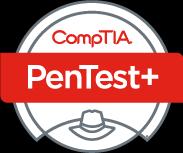 It is an intermediate-level security certification. This certification aims to equip learners to perform penetration testing methods and vulnerability management efficiently. The certificate holders will work towards enhancing the resilience of networks.
It is an intermediate-level security certification. This certification aims to equip learners to perform penetration testing methods and vulnerability management efficiently. The certificate holders will work towards enhancing the resilience of networks.Skills that learners will acquire:
- Learners will learn how to perform pen testing for applications in different environments such as Cloud, Web, IoT, Hybrid, and on-premises.
- They will perform vulnerability management, including planning, assessment, scoping, analysis, scanning, etc.
- They can prepare reports with proposed solutions to enhance the security of systems.
- They can support organizations to meet risk and compliance standards by leveraging advanced security techniques.
Best for:
- The program is best for the following professionals.
- Penetration testers for Web apps and Cloud
- Cloud and Network Security Specialists
Prerequisites:
Learners need to have a minimum of 3- 4 years of experience in information security.
CISSP
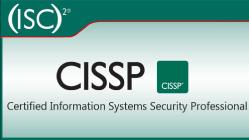 CISSP refers to Certified Information Systems Security Professional.
CISSP refers to Certified Information Systems Security Professional.Skills that learners will acquire:
- Learners can design robust Cybersecurity architecture as well as implement and manage Cybersecurity programs in your organization.
- They can effectively manage risks and vulnerabilities in computer systems
- Along with that, you will be familiar with cryptography, as well as OSI and TCP/IP models.
Best for:
This course is suitable for the following:
- Chief Information Officers
- Security Systems Engineers
- Security Analysts
- Security Auditors and Architects
Prerequisites:
Learners must have a minimum of five years of experience in security systems.
They must have a degree or Diploma.
They must have worked in the various domains of ISC2 CBK
CISA
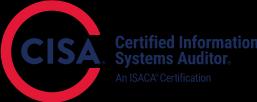 CISA stands for Certified Information Systems Auditor.
CISA stands for Certified Information Systems Auditor.
Skills that learners will acquire:
- Learners will become an expert in information systems and auditing processes
- They can easily manage IT operations in your IT environment
- They will be familiar with information systems operations and ensure business resilience on a large scale.
- They can protect information assets in the best manner possible.
Best for:
- This course is best suitable for security auditors. And it will be best for those who monitor, analyse, and control their organization's information systems.
Prerequisites:
Learners must have a minimum of five years of experience in information security.
CISM
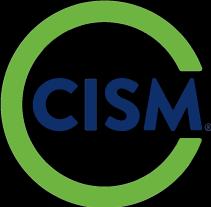 CISM is the short form of Certified Information Security Manager.
CISM is the short form of Certified Information Security Manager.Skills that learners will acquire:
- Learners can efficiently perform security program development and management as well as incident and risk management.
- They can establish security systems to meet security compliances and integrity accurately.
Best for:
- This course suits those who wish to elevate from being a team member to a security manager.
Prerequisites:
Learners must have a minimum of five years of experience in information systems.
CEH
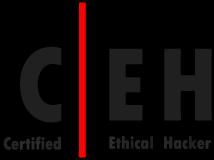 CEH refers to Certified Ethical Hacker. It is an intermediate-level security program.
CEH refers to Certified Ethical Hacker. It is an intermediate-level security program.Skills that learners will acquire:
- Learners will learn ethical hacking over 20 domains
- They will be familiar with advanced hacking tools and techniques
- They will become an expert in advanced packet analysis and penetration testing techniques
- They will understand the information security controls, potential security threats, as well as crucial security laws and standards.
Best for:
- This course is best suitable for the following:
- Network security officers
- Site administrators
- IT operations manager
- IT security officers.
Prerequisites:
A degree or Diploma is preferred to take this certification.
| Checkout "CyberSecurity Interview Questions" |
CASP+
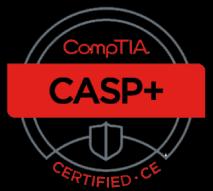 CASP is the short form of CompTIA Advanced Security Practitioner. Know that it is one of the advanced level Cybersecurity certifications.
CASP is the short form of CompTIA Advanced Security Practitioner. Know that it is one of the advanced level Cybersecurity certifications. Skills that learners will acquire:
- Learners will be capable of building strong security architecture for your organization
- They will learn how to implement security policies and standards for your organization
- They can evaluate the security-readiness of your security systems. Based on this, you can implement suitable preventive measures to increase the resilience of your security systems. By doing so, you can prevent any future cyber-attacks absolutely.
- They can make incident responses, detect threats, and implement automation. Simply put, you can implement security solutions for your systems – no matter how complex they are.
- They can precisely satisfy the risk and compliance requirements.
- Over and above, you can perform digital forensic analysis effectively.
Best for:
- This course is best for the following.
- Security architects
- Senior security engineers
Prerequisites:
Learners must have a minimum of ten years of experience in IT administration, of which five years must be in security management.
CCSP
 CCSP stands for Certified Cloud Security Professional. This course is one of the popular security certifications of ISC2.
CCSP stands for Certified Cloud Security Professional. This course is one of the popular security certifications of ISC2.Skills that learners will acquire:
- Learners will be familiar with implementing the best practices, policies, and procedures
- They can design cloud security architecture and perform security operations to secure data and applications
- They will learn to satisfy the regulatory compliance frameworks for a secured IT environment.
Best for:
This course is best suitable for the following:
- Cloud architects
- Cloud administrators
- Cloud security analysts
- Auditor of cloud computing
Prerequisites:
Learners must have a minimum of five years of experience in information technology, of which three years must be in information security. And they must have a minimum of one year of experience in one or more domains of CCSP CBK.
Or else, they must have a CISSP certificate instead of having all the abovementioned requirements.
CHFI
 CHFI refers to Computer Hacking Forensic Investigator. It is one of the leading certifications offered by the EC Council.
CHFI refers to Computer Hacking Forensic Investigator. It is one of the leading certifications offered by the EC Council.Skills that learners will acquire:
Learners will become an expert in digital forensic methodologies. So you can perform digital forensic investigation in-depth and evidence analysis using forensic methods.
Best for:
This certification is best for:
- Information security and computer forensics professionals
- Forensic analysts
- Cybercrime investigators
- Cyberdefense forensic analysts
- Incident Responders
- IT Auditors
- Malware Analysts
- Chief Security Officers
Prerequisites:
Learners must have a minimum of two years of experience in the information security domain. Or else, they must have completed official EC-Council training.
ECSA
 ECSA stands for EC-Council Certified Security Analyst. It is yet another certification offered by EC Council. If you have acquired CEH certification, you can quickly complete the ECSA program. It is essential to note that completion of CEH is not mandatory.
ECSA stands for EC-Council Certified Security Analyst. It is yet another certification offered by EC Council. If you have acquired CEH certification, you can quickly complete the ECSA program. It is essential to note that completion of CEH is not mandatory.Skills that learners will acquire:
- Learners will learn advanced security techniques and licensed penetration tester methodologies.
- They will become experts in TCP/IP packet analysis, firewall penetration methodologies, cloud penetration methodologies, vulnerability analysis, and report writing.
Best for:
This certification is best for security architects, intermediate-level security managers, and penetration testers. Apart from these, ethical hackers, security testers, firewall admins, and security analysts can take this program to improve their security management skills.
Prerequisites:
You need to have two years of experience in information security. Or else, you must have an official EC-council training session.
GCIH
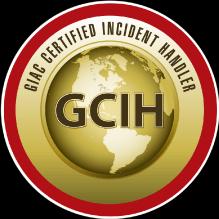 GCIH refers to GIAC Certified Incident Handler. It is one of the courses offered by GIAC.
GCIH refers to GIAC Certified Incident Handler. It is one of the courses offered by GIAC.Skills that learners will acquire:
- Learners will understand common cyberattack ways and how to manage security incidents tactfully
- They will be familiar with computer crime investigation in greater detail
- They will understand various computer and network hacker exploitations
- They will learn to use multiple hacker tools such as Metasploit, Nmap, and Netcat.
Best for:
- This program is suitable for the following:
- Incident handlers
- Incident handling team leads
- System administrators
- Security practitioners
- Security architects.
Prerequisites:
There is no specific requirement to attend this program. However, minimum one or more years of experience in security will be beneficial.
GSEC
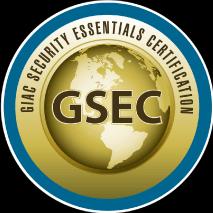 GSEC is the short form of GIAC Security Essentials. It is one of the entry-level programs for security professionals offered by GIAC.
GSEC is the short form of GIAC Security Essentials. It is one of the entry-level programs for security professionals offered by GIAC.Skills that learners will acquire:
- Learners will become familiar with access control and password management
- They will have expertise in cloud operations and applying cryptographic techniques
- They will learn incident handling and response, vulnerability scanning, mobile device security, and penetration testing.
- They will acquire skills in logging as well as log analysis.
Best for:
- This certification is best for professionals who have recently stepped into security management. Also, security managers, security administrators, forensic analysts, IT engineers, penetration testers, and auditors can use this program to gain solid computer security and analysis knowledge.
Prerequisites:
There is no specific requirement to attend this program. However, minimum one or more years of experience in security will be beneficial.
GCFA
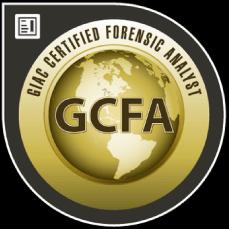 GCFA is the short form of GIAC Certified Forensic Analyst.
GCFA is the short form of GIAC Certified Forensic Analyst.Skills that learners will acquire:
- By collecting and analyzing computer data, learners will learn how to investigate incidents. So, you can easily manage data breach intrusions and advanced persistent threats.
- Also, you can understand the anti-forensic methods used by cyber attackers.
- They will attain expertise in handling timeline analysis, memory forensics, threat hunting, and APT intrusions.
Best for:
- This program is best for the following professionals.
- Incident response team members
- SOC analysts
- Digital forensic analysts
- Information security professionals
- Penetration testers
- GCFE and GCIH certification holders.
Prerequisites:
There is no specific requirement to attend this program. However, minimum one or more years of experience in security will be beneficial.
GMOB
 It refers to GIAC Mobile Device Security Analyst. This is another product of GIAC.
It refers to GIAC Mobile Device Security Analyst. This is another product of GIAC.Skills that learners will acquire:
- Learners will be familiar with securing mobile devices.
- They can prevent malware completely.
- It doesn’t matter whether it is an Android or IOS device – they can quickly perform jailbreaking and rooting on mobile devices.
- They can assess and analyse application security as well as network traffic. Even they can intercept the encrypted network traffic.
- Above all, you can perform penetration testing for mobile devices.
Best for:
This course is best for the following:
- Security professionals who manage mobile devices and tablets
- Penetration testers
- Ethical hackers
- Security auditors
- Systems and network administrators.
Prerequisites:
This certification also doesn’t expect any requirements to attend the program. However, minimum one or more years of experience in security will be beneficial.
GPEN
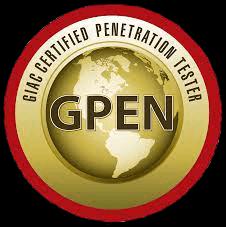 GPEN stands for GIAC Penetration Tester. It is yet another certification offered by GIAC at the intermediate level.
GPEN stands for GIAC Penetration Tester. It is yet another certification offered by GIAC at the intermediate level.Skills that learners will acquire:
- Learners can perform extensive pen testing with advanced Windows power shell skills.
- They will be capable of performing vulnerability scanning in security systems and analysing the results in-depth.
- They will understand different types of password attacks, as well as how to prevent them altogether.
- They will be familiar with the exploitation phase of penetration tests.
Best for:
This course is best for the following:
- Security professionals who deal with networks and systems vulnerabilities
- Penetration testers
- Ethical hackers
- Defenders
- Auditors
- Forensic specialists
Prerequisites:
There is no specific requirement to attend this program. However, minimum one or more years of experience in security will be beneficial.
OSCP
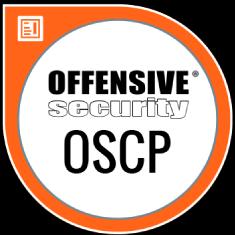 OSCP is the short form of Offensive Security Certified Professional. It is an advanced-level security course.
OSCP is the short form of Offensive Security Certified Professional. It is an advanced-level security course.Skills that learners will acquire:
- Learners will become competent penetration testers.
- They will be experts in detecting vulnerabilities and configuration mistakes.
- They will be familiar with using Kali Linux distribution. So, you can assess the security of computer systems more effectively.
- They can deploy and handle malicious hacker tools to ensure the security of your IT environment.
- They will achieve a wide array of knowledge in information gathering in both active and passive modes, web application attacks, vulnerability scanning, password attacks, fixing exploitation, and a lot more.
Best for:
This certification is best for the following professionals:
- Security Analysts
- Computer forensic analysts
- Penetration testers
- Security Engineer
- Malware Analysts
- Security auditor
Prerequisites:
You don't need work experience or educational qualifications to attend this program. However, if you have completed OffSec’s penetration testing with Kali Linux, you can easily pass this certification. Additionally, having substantial knowledge of windows and Linux administration experience, TCP/IP networking, and Bash or Python scripting provides an extra advantage.
SSCP
 SSCP refers to Systems Security Certified Practitioner. ISC2 offers this certification. This certification focuses on establishing a concrete foundation for learners to powerfully manage security systems and defend against cyber-attacks.
SSCP refers to Systems Security Certified Practitioner. ISC2 offers this certification. This certification focuses on establishing a concrete foundation for learners to powerfully manage security systems and defend against cyber-attacks.Skills that learners will acquire:
- Learners will gain knowledge to implement, track, and manage IT infrastructure covered with security policies, best practices, and procedures.
- They will attain expertise in security operations and administration.
- They will be familiar with risk management and incident response.
- They will acquire knowledge in access control, network security, cryptography, and system security.
Best for:
This program is best for the following:
- Network security engineers
- System and security administrators
- Security and network analysts
- Database administrators
- Systems Engineer
Pre-requsities:
You need to have atleast one year experience in information systems and security practices.
CCNP Security
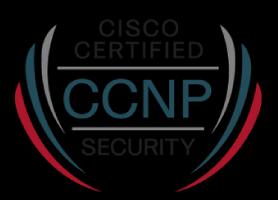 This certification aims to enhance learners' skills in protecting networks and data in an IT environment.
This certification aims to enhance learners' skills in protecting networks and data in an IT environment.Skills that learners will acquire:
You will gain knowledge in security and automation.
Best for:
- This program is suitable for the following:
- Security Engineer
- Network security engineer
- Information security analyst
- Information security engineer
Prerequisites:
There are no prerequisites for attending this program. If you have 3 to 5 years of experience in security systems, it will be supportive to complete this course quickly.
| Related Article: "Cyber Security Best Practices" |
CRISC
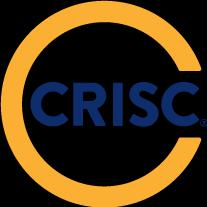 CRISC is the short form of Certified in Risk and Information Systems Control. This certification focuses on improving learners' skills in enterprise IT risk management.
CRISC is the short form of Certified in Risk and Information Systems Control. This certification focuses on improving learners' skills in enterprise IT risk management.Skills that learners will acquire:
- Learners will implement best practices in the IT environment to detect, assess, analyse, and address risks efficiently.
- They will become an expert in IT security governance
- They will be familiar with risk monitoring and reporting
Best for:
- This course is suitable for Information Security auditors of the middle level.
Prerequisites:
Learners must have around ten years of experience in security domain of which three years must be in CRISC domain.
CCSK
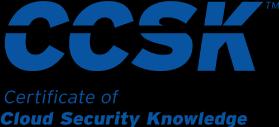 CCSK refers to Certificate of Cloud Security Knowledge.
CCSK refers to Certificate of Cloud Security Knowledge.Skills that learners will acquire:
- Learners can develop a holistic cloud security program with all the security standards they must have.
- They can implement best practices to strengthen Identity management and access control, SecaaS, application security, cloud incident response, data encryption, and so on.
- Most importantly, they can implement effective cloud governance strategies and configure robust security controls.
Best for:
- This course is best for the following:
- Cybersecurity analysts
- Security and systems engineers
- Security architects
- Security administrators
Prerequisites:
There is no specific requirement to attend this program. However, minimum one or more years of experience in security will be an advantage.
CCAK
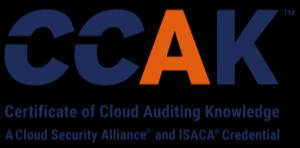 CCAK stands for Certificate of Cloud Auditing Knowledge.
CCAK stands for Certificate of Cloud Auditing Knowledge.Skills that learners will acquire:
- Learners can perform full-fledged auditing in the cloud environment
- You will install the proper controls to ensure confidentiality and integrity in the Cloud.
- They can ensure compliance and prevent risks cleverly
- They can gain auditing as well as cloud expertise through a single certification
- They can quickly resolve challenges in technology stacks, DevOps, deployment frameworks, CI/CD, etc.
Best for:
- This program is best for the following professionals.
- Internal and external assessors and auditors
- Compliance managers
- Security analysts
- Security architects
Prerequisites:
There is no specific requirement to attend this program. However, minimum one or more years of experience in security will be an advantage.
CCNA Security
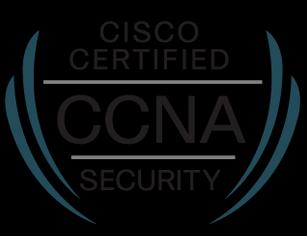 This certificate is also called as Cisco Certified Security Associate. CISCO offers this certification intending to equip learners with security concepts and their implementation across an IT environment.
This certificate is also called as Cisco Certified Security Associate. CISCO offers this certification intending to equip learners with security concepts and their implementation across an IT environment.Skills that learners will acquire:
- Learners will implement network security concepts and technologies in security systems
- They will leverage security controls on switches, routers, and firewalls.
- They will be familiar with cryptographic methods as well as IPSec basics and operations.
- Over and above, they can manage and secure firewalls tightly.
Best for:
- This course is suitable for network engineers who want a sound security background.
Prerequisites:
If learners have achieved basic level certification CCENT,it will be beneficial. Also,knowledge in CCNA routing and switching will be an added advantage.
CWSP
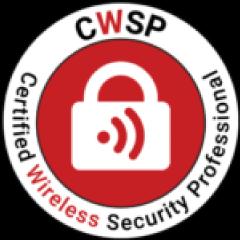 CWSP refers to Certified Wireless Security Professional. It is the certification designed to equip learners to secure wireless LAN connections efficiently.
CWSP refers to Certified Wireless Security Professional. It is the certification designed to equip learners to secure wireless LAN connections efficiently.Skills that learners will acquire:
- Learners will be familiar with WLAN discovery techniques, as well as intrusion and attack techniques.
- They will implement Wireless Intrusion Prevention Systems (WIPS) effortlessly
- They will design various network security models.
- They can build robust security networks from the root
- They will enforce effective wireless security policies to protect systems
Best for:
- Wireless security engineers can gain a lot by completing this certification.
Prerequisites:
Learners must have a CWNA certificate.
CPP
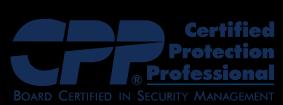 CPP is the short form of Certified Protection Professional. This is the cybersecurity certification ASIS offers to produce more competent security management professionals.
CPP is the short form of Certified Protection Professional. This is the cybersecurity certification ASIS offers to produce more competent security management professionals. Skills that learners will acquire:
- You will get expertise in the seven key domains of security. The domains play a crucial role in security management.
Prerequisites:
You must have at least seven years of experience in the security domain, of which three years must be responsible for a security function. Or else, you should have five to six years of security management, of which three years should be on a specific security function
CCIE Security
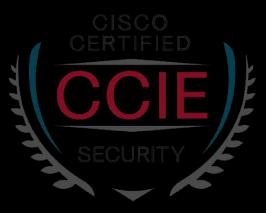 CCIE is the short form for Cisco Certified Internetwork Expert Security. This is the cybersecurity certification offered by CISCO, aiming to create leaders in security technologies. It includes a qualifying exam as well as a lab exam.
CCIE is the short form for Cisco Certified Internetwork Expert Security. This is the cybersecurity certification offered by CISCO, aiming to create leaders in security technologies. It includes a qualifying exam as well as a lab exam.Skills that learners will acquire:
- Learners can resolve complex security problems in your organization in the best way.
- They will design, implement, and repair full-scale security technologies
- They will reduce security threats, risks, and vulnerabilities on a larger scale.
Prerequisites:
There are no specific requirements to attend this exam, but at least 5 to 7 years of experience managing security technologies is preferred.
Conclusion:
Now it’s time to wrap! We are confident that you must have gained a good idea about various cybersecurity certifications through this blog. You must determine the right course based on your requirements and competency from the given list. The significant thing is that once you have chosen the certification, attend the training immediately. Learn the concepts, tools, and methods from A to Z and get hands-on experience. This strategy will polish your skills and help you excel and glow as a shining star.
 On-Job Support Service
On-Job Support Service
Online Work Support for your on-job roles.

Our work-support plans provide precise options as per your project tasks. Whether you are a newbie or an experienced professional seeking assistance in completing project tasks, we are here with the following plans to meet your custom needs:
- Pay Per Hour
- Pay Per Week
- Monthly
| Name | Dates | |
|---|---|---|
| Cyber Security Training | Feb 28 to Mar 15 | View Details |
| Cyber Security Training | Mar 03 to Mar 18 | View Details |
| Cyber Security Training | Mar 07 to Mar 22 | View Details |
| Cyber Security Training | Mar 10 to Mar 25 | View Details |

Madhuri is a Senior Content Creator at MindMajix. She has written about a range of different topics on various technologies, which include, Splunk, Tensorflow, Selenium, and CEH. She spends most of her time researching on technology, and startups. Connect with her via LinkedIn and Twitter .



